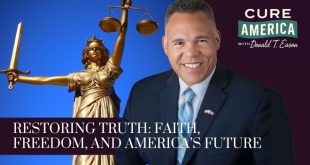Dr. William Allen, a former COO of the Center for Urban Renewal and Education (CURE) and a current member of CURE’s Advisory Board, is a member of Florida’s African American History Standards Workgroup. He recently spoke with ABC News about Florida’s new standards on teaching black history.
Critics claim that the Florida Board of Education wants to teach that slaves benefited from being slaves. The most high-profile critic is Vice President Kamala Harris, who mischaracterized the new standards last week.
Dr. Allen put the matter in context and set the record straight.
Harris focused on this sentence in the 216-page Social Students standards document (PDF):
“Instruction includes how slaves developed skills which, in some instances, could be applied for their personal benefit.”
The standards include many aspects of slavery, including the expansion of slavery, slave revolts, the abolitionist movement, the Underground Railroad, and slavery in other countries.
Dr. Allen said Harris’s criticism was in error and categorically false.
“It was never said that slavery was beneficial to Africans…It is the case that Africans proved resourceful, resilient, and adaptive and were able to develop skills and aptitudes which served to their benefit both while enslaved and after enslavement.”
Dr. Allen spoke to Jesse Watters on Fox News on Monday.
He said that this “curriculum is devoted to telling the truth, whereas Kamala Harris has retailed a lie.”
Not teaching the whole truth about slavery erases the stories of the people who were enslaved and lived their experiences, Dr. Allen said. Watch the clip below for more. You’ll want to hear what this scholar had to say about Frederick Douglass.
Kamala Harris says Florida’s curriculum teaches students that slaves benefitted from slavery. The author of that curriculum, Dr. William Allen, disagrees. He joins Primetime and says the left is erasing the story of his slave ancestors. pic.twitter.com/8CQ9LBef4M
— Jesse Watters (@JesseBWatters) July 25, 2023
 CURE News and Clergy Blog News and Commentary for Christians
CURE News and Clergy Blog News and Commentary for Christians




Dr. Allen has for decades been among the nation’s foremost historians and sociologists. There is a little problem, however, with the term “personal benefit” within the new Florida Black history guidelines: The slave in 1720 who learned to be a blacksmith by 1750 probably handed off that skill to a son by 1780. That son could not take that skill and “benefit” from it financially. If anything, he was likely sold to another person who needed a blacksmith. The scenario may have been a bit different at the end of the end of Civil War and onto Reconstruction. Good examples of this Black version of the Protestant Work Ethic could found in “Up From Slavery” by Booker T. Washington, “The Souls of Black Folk” by W.E.B. Du Bois and a number of other post-slavery narratives. Most importantly, the subject has spurred an increased and revitalized interest in studying American History. That’s a good thing.